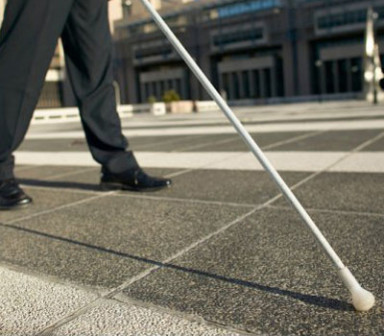Joint Deputation to the City of Edinburgh Council Transport and Environment Committee: City of Edinburgh Access Panel, RNIB Scotland, Sight Scotland and Sight Scotland Veterans.
On 25 April 2024, the City of Edinburgh Council Transport and Environment Committee will hear feedback about the development of Leith Walk and the Trams to Newhaven Project. You can read our joint deputation with RNIBScotland and Edinburgh Access Panel below.

As a joint deputation comprising of the City of Edinburgh Access Panel, RNIB Scotland, Sight Scotland and Sight Scotland Veterans, we would like to put our concerns on the record.
In 2023, RNIB Scotland published Street Credibility to summarise and highlight three key principles relating to making streets more accessible for people with sight loss.
These include:
1. Reducing the hazard of street clutter and obstructed pavements.
2. The importance of having kerbs and signalised controlled crossings.
3. Avoidance of moving vehicles.
Since 2017 we have raised our concerns about the lack of delineation between the cycle-path and the footway, the need to cross the cycle-path to access bus stops and the random and misleading use of tactile paving on Leith Walk.
There has been a consistent concern about the use of tactile paving, either as a delineator between the footway and the cycle-path, and more recently as a marker for continuous footways.
Sight Scotland and Sight Scotland Veterans have highlighted similar concerns. These include low kerbs that guide dogs cannot detect and poor surface colour contrast. During a site visit, Marie O'Donnell, a Rehabilitation Officer for Sight Scotland as well as a guide dog owner, reported that trying to navigate the street was "terrifying". She demonstrated that her guide dog was unable to detect the low kerb separating the cycle-path and the footway, meaning she could have unknowingly walked into an oncoming cyclist. She said that in her professional role as a rehabilitation worker, her instinct would be to tell people with visual impairment to avoid Leith Walk “at all costs”.
Sight Scotland and Sight Scotland Veterans would also like to express concern at how feedback from the visually impaired community seems to have been overlooked during the design stage, and subsequently when raised after the completion of works.
We advocate for meaningful engagement of the visual impairment community in the design process and hope the newly formed Edinburgh Accessibility Commission is an effective vehicle so that feedback from all disabled people is implemented.
Feedback from blind and partially sighted people must be considered in the evaluation of the Leith Walk project to avoid inaccessible designs being replicated in other areas of the city where developments are planned.
We urge the council to review the layout of Leith Walk especially as the Trams to Newhaven project is now complete and a two-year defect period opens.
You may also be interested in
Our Campaigns
Our dedicated Sight Scotland policy team work with blind and partially sighted people to campaign for positive change. Read more about our campaigning work here.